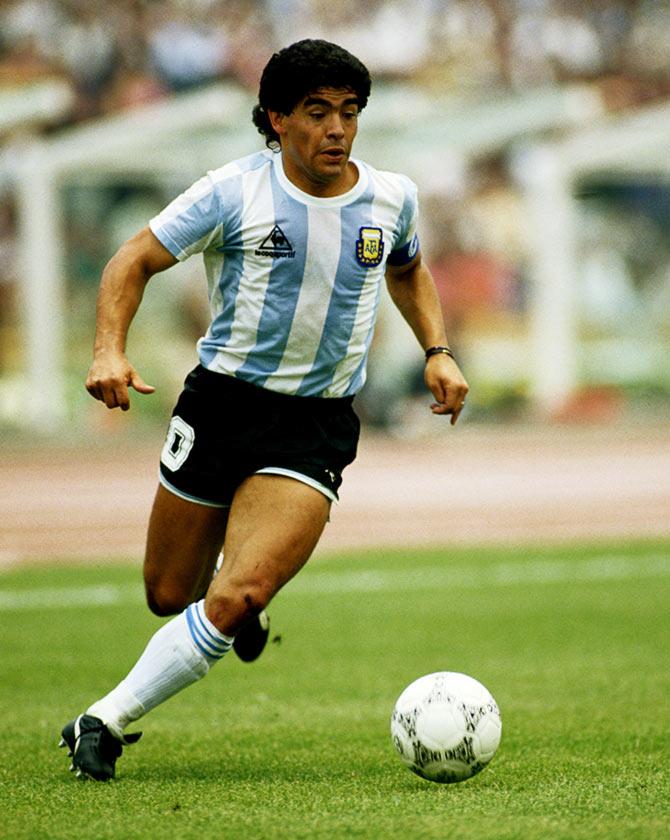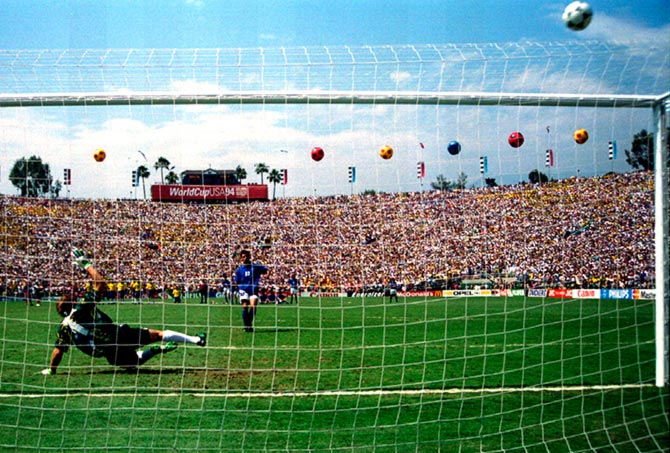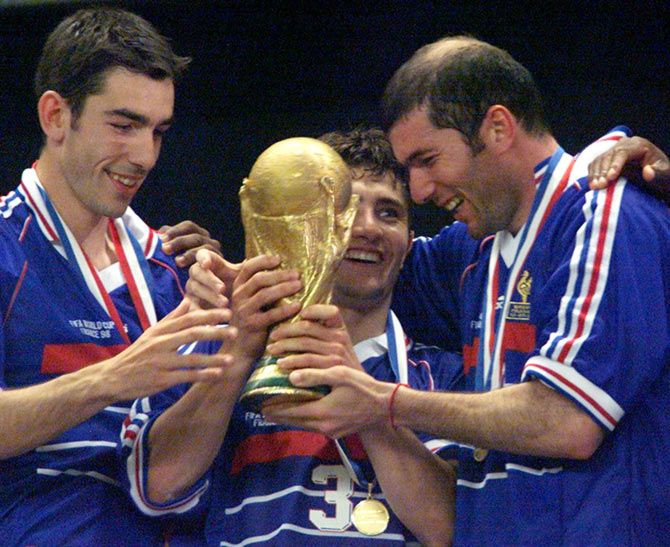Photographs: David Cannon/Allsport/Getty Images
The fourth of a five-part history of the World Cup from Uruguay in 1930 up to the preparations for the 2014 finals in Brazil:
Part Four: The tournaments from 1986 to 1998
1986 MEXICO
Final: June 29 1986: Azteca Stadium, Mexico City
ARGENTINA 3 WEST GERMANY 2
Attendance: 114,590
Colombia were due to host the 1986 World Cup but pulled out three years earlier saying the cost was prohibitive and their infrastructure could not support it.
FIFA awarded the tournament to Mexico, who became the first country to host it twice.
The heat and altitude that affected performances in 1970 did so again but players were fitter and better prepared than 16 years earlier.
- Football World Cup 2014 Schedule
The tournament consisted of 24 teams but FIFA introduced a knockout second round of 16 nations rather than the second round groups of 1982.
Champions Italy made it as far as the second round where they lost 2-0 to France, while favorites Argentina, hosts Mexico, England, Brazil and West Germany were among those who reached the last eight.
The outstanding match brought together England and Argentina for the first time since their armed conflict over the Falkland/Malvinas Islands in 1982.
Argentina emerged the victors on June 22 at the Azteca Stadium in Mexico where Diego Maradona won the match with his infamous "Hand of God" goal and his utterly brilliant second when he dribbled from inside his own half, took on and beat half the England defense before rounding goalkeeper Peter Shilton to score.
Argentina beat Belgium in the semis, when Maradona scored another dazzling solo goal, to reach the final, while West Germany, as they had done in 1982, beat France in the semis.
The South Americans were the better team for much of a thrilling final at the Azteca and built a 2-0 lead after 56 minutes with goals from Jose Luis Brown and Jorge Valdano.
Karl-Heinz Rummenigge and Rudi Voeller pulled Germany level with eight minutes to go before a dinked pass from Maradona set Jorge Burruchaga away and he made no mistake with an 85th-minute winner.
Beckenbauer captained Germany to the World Cup title in 1990
Image: The Germany players celebrate after beating beating Argentina in the 1990 World Cup final in Rome.Photographs: David Cannon/Allsport/Getty Images
1990 ITALY
Final: July 8 1990: Olympic Stadium, Rome
WEST GERMANY 1 ARGENTINA 0
Attendance: 73,603
The 1990 finals in Italy were a curious mixture of good and bad games, the final fitting into the second category.
There were also several wonderful surprises and days of woeful refereeing.
Penalty shootouts began to decide more matches and, although the fans in soccer-mad Italy were passionate about it all, the event left behind bittersweet memories.
Italy's failure to reach the final and the disappointing quality of that showpiece occasion were two of the main reasons.
Salvatore "Toto" Schillaci, who had only played twice for Italy before the finals, emerged as the competition's top scorer with six goals and became an instant national hero.
Champions Argentina were stunned in the opening match when they lost 1-0 to Cameroon and although they recovered to reach the final, that defeat underlined their vulnerability.
West Germany won a poor final with a late penalty from Andreas Brehme and Argentina finished the match with nine men, the first team to have a player, or even two, dismissed in the title decider.
Franz Beckenbauer became the first man to captain and later coach a side to World Cup success.
Baggio's penalty miss handed Brazil the 1994 World Cup title
Image: Italy's Roberto Baggio hits his penalty over the bar in the World Cup final against Brazil at the Rose Bowl in Pasadena, California, on July 17, 1994.Photographs: Gary Hershorn/Reuters
1994 UNITED STATES
Final: July 17 1994, Rose Bowl, Pasadena
BRAZIL 0 ITALY 0 (Brazil won 3-2 on penalties)
Attendance: 94,194
FIFA's decision to stage the finals in the United States was a brave one, even though it failed to realize the goal of establishing soccer as a major sport there in the immediate years afterwards.
It did, though, produce a fine World Cup, marred only by a drab 0-0 draw in the final.
In a sense, it was a World Cup held in a bubble.
Around the stadiums, or in the cities where matches were played, there was a level of local interest and the competition did produce the biggest total attendance figures in World Cup history.
But millions of Americans had no idea the World Cup was happening in their country and, if they did, they were not in the least bit interested.
The champions were now playing as a unified German team and were expected to do well. So, too, were Brazil and Italy.
It was an open World Cup and it produced surprises.
Romania, with Gheorghe Hagi in his pomp, and Bulgaria, with Hristo Stoichkov pulling the strings, flew the flag for the newly liberated Eastern European nations.
The tournament followed the same pattern as 1990 with 24 teams moving into a knockout stage, which is where Argentina, the United States and the Nigerians went out.
The US did well to reach the last 16 following a 2-1 win over Colombia in Pasadena on June 22. But it was a match remembered now for terrible reasons because it cost the innocent Colombian defender Andres Escobar his life.
He put through his own net in the first half to give the United States the lead and was murdered when he went home the following week because Colombia's subsequent defeat cost heavy gamblers big money losses.
Argentina, whose skipper Diego Maradona was suspended after testing positive for doping, lost 3-2 to Romania while Brazil and Italy eventually battled through to the final in Pasadena.
Then, for the first time in World Cup history, the final was decided on a penalty shootout after a dour goalless draw under a blistering sun.
Brazil won it 3-2 after the "Divine Ponytail" Baggio, who had been Italy's hero with six goals, blasted his penalty high over the bar.
Brazil had no answer to the brilliance of Zidane in the final
Image: Zinedine Zidane (right) celebrates with his France team mates after winning the 1998 World Cup final in Paris, on July 12, 1998.Photographs: Reuters
1998 FRANCE
Final: July 12 1998: Stade de France, Paris
FRANCE 3 BRAZIL 0
Attendance: 80,000
When Joao Havelange was bidding to become FIFA president in 1974 he promised that if he was elected, Asian and African countries would get more opportunities to compete on the world stage.
The process began in 1982 when the World Cup was increased to 24 nations and was completed in 1998 when the first 32-team tournament was staged.
Japan, South Africa and Jamaica were among the debutants at France 98, which began with champions Brazil beating Scotland 2-1 in Paris on June 10.
Brazil were again expected to do well but France were expected to do even better with the benefit of a far-sighted national youth training program producing the likes of Zinedine Zidane, David Trezeguet, Patrick Vieira and Thierry Henry.
France, debutants Croatia, Brazil and Netherlands made it through to the last four.
Brazil beat the Dutch on penalties in one semi-final and France edged Croatia 2-1 in the other to set up a first final between the hosts and the champions.
In the end, France won their first World Cup with even more ease than the 3-0 result suggests. Brazilian striker Ronaldo had a seizure on the night before the final and was clearly unfit to play - but did.
Brazil had no answer to the brilliance of Zidane, who ran the match and scored twice. Emmanuel Petit added the coup de grace in the last minute with the third goal.
The scenes on the Champs Elysees on the night of the final will never be forgotten by those lucky enough to be there. The World Cup, invented by the Frenchman Jules Rimet, had finally come home.





Comment
article